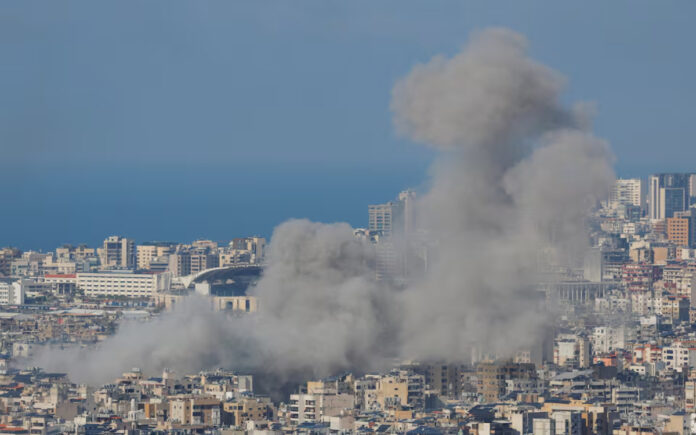Beirut/Jerusalem: The Israeli military launched one of its most intense daytime airstrikes yet on Hezbollah-controlled areas in Lebanon on Tuesday, targeting Beirut’s southern suburbs and parts of central Lebanon. Over 20 people were killed in these operations as the conflict escalated between Israel and Hezbollah.
Thick plumes of smoke rose over Beirut as Israeli jets conducted multiple airstrikes on the Dahiyeh area, a Hezbollah stronghold in the southern suburbs, after issuing warnings to civilians via social media. The Israeli military later reported it had “dismantled” a significant portion of Hezbollah’s missile and weapon facilities in the area, although Hezbollah denied the extent of the damage.
In northern Israel, the city of Nahariya saw two fatalities when a residential building was struck by a Hezbollah-claimed drone attack aimed at an Israeli military base east of the city. As Israeli civilians took shelter across northern Israel, another drone reportedly hit a kindergarten yard in a Haifa suburb. Fortunately, no injuries were reported as the children had been moved to safety in time.
Further airstrikes targeted several Lebanese towns. In Mount Lebanon province, eight people were killed in Baalchmay village and 15 in Joun village, according to Lebanon’s health ministry. Additional strikes in the south and northeast killed several others, including fatalities in Tefahta, Nabatieh, Tyre, and Hermel.
Following heavy bombardments since September, Beirut’s southern suburbs have been largely deserted, with residents fleeing the area. Social media footage showed missiles demolishing a 10-story building, reducing it to rubble and filling the air with dust and debris.
This escalation traces back to the Gaza war, with Israel intensifying operations against Hezbollah, which it considers an Iranian-backed threat. In recent strikes, Israel has targeted Hezbollah’s leadership and infrastructure extensively, flattening sections of the southern suburbs and border villages. Among those killed was Hassan Nasrallah, a key Hezbollah leader.
Also Read | Chinese Leaders Urge Inquiry into Zhuhai Tragedy as Social Media Questions Rise
On Tuesday, Israeli military chief Herzi Halevi, visiting Israeli forces in southern Lebanon, remarked that the military was “operating very strongly” in the country. The Lebanese health ministry estimates at least 3,287 people have died in Lebanon since the hostilities began, with the majority occurring in recent weeks. Israeli sources reported that about 100 civilians and soldiers in northern Israel, the Golan Heights, and southern Lebanon have been killed by Hezbollah attacks in the past year. Hezbollah claimed its forces have killed over 100 Israeli soldiers since early October.
In a statement, Hezbollah announced it had forced an Israeli retreat from several towns in southern Lebanon, though it did not specify which areas. Hezbollah also warned of additional strikes targeting Israeli military sites. Israeli reports indicated that Hezbollah fired 55 projectiles into Israel on Tuesday alone.
Ceasefire Efforts and Political Responses
Efforts for a ceasefire have seen mixed progress. U.S. Special Envoy Amos Hochstein expressed hope for an impending truce in Lebanon, despite setbacks in Gaza where Qatar has paused mediation efforts. Israeli Foreign Minister Gideon Saar acknowledged “some progress” in ceasefire talks for Lebanon, yet Israel’s Defense Minister Israel Katz emphasized that no ceasefire will be reached until Israel meets its objectives in Lebanon, including disarming Hezbollah and ensuring security for Israeli citizens displaced by the conflict.
Also Read | Republicans Move Closer to House Majority, Gaining Full Congressional Control
Meanwhile, the recent U.S. presidential election may impact U.S. policy in the region. President-elect Donald Trump has appointed former Arkansas Governor Mike Huckabee, a staunch supporter of Israel, as the new ambassador to Israel. Huckabee’s anti-ceasefire stance, particularly regarding Gaza, suggests a shift toward reduced U.S. pressure on Israel for restraint, a stance Israeli officials have welcomed.
In Lebanon, the government, which includes Hezbollah representatives, continues to call for a ceasefire grounded in a U.N. Resolution that originally ended the 2006 Lebanon-Israel war. Lebanese leaders insist on a resolution that would ensure stability and security for all Lebanese citizens, urging international support for peace.



